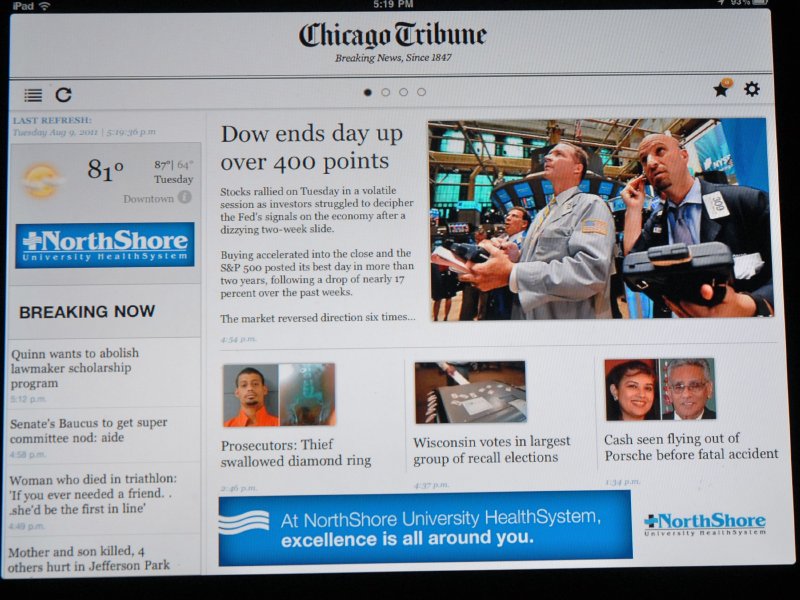It's no surprise that newspapers are searching for ways to survive as readers drift away from the traditional paper product to the Internet.
The Milwaukee Journal Sentinel isn't alone in planning to erect some sort of a pay wall to charge JS Online readers for what has been free access to the product that newspaper readers have had to pay for.
The kink in the transition, of course, is that advertising isn't moving to the Web in the same way readers have been. And large organizations like the Journal Sentinel have a large infrastructure to support the news-gathering operation.
An even larger news-gathering operation is the Chicago Tribune, which is apparently dabbling in technology in the shift from paper to digital.
Mark Millan is reporting on CNN.com that what used to bill itself as "The World's Greatest Newspaper" is developing its own tablet device (like the iPad), which would go to newspaper subscribers.
Of course, there already is an iPad, along with a string of competitors, and this route seems like an expensive dead-end for the Tribune Co. The Tribune even has a free app for the iPad.
Why develop unique hardware that would compete with existing products from established companies?
Tim Carmody makes pretty much the same point in his blog on Wired.com, a post that features the title "Media Death March."
He writes: "Hardware is hard. It’s hard to develop, it’s hard to design, it’s hard to find partners, it’s hard to source parts, it’s hard to build, it’s hard to get working, it’s hard to keep costs down and it’s extraordinarily hard at the end of that process to produce something popular."
Carmody bills himself as a futurist, and he sees potential success of a combination of print and digital subscriptions.
"But if major publishers are seriously prepared to blow up their primary revenue stream — print advertising — and slap together a giveaway tablet in order to save money on ink, God help them."
It does smell like a failure, an expensive failure, in the making. And the newspaper industry doesn't have a lot of money to toss into the trash these days.
A new subchannel coming next month: Channel 49 (Channel 19 on Time Warner and Charter Cable) will be the Milwaukee home for Bounce TV, a digital subchannel targeting African-American viewers between the ages of 25 and 54.
The main channel 49.1 will continue to carry Me TV's lineup of old TV, with Bounce TV as one of its over-the-air subchannels. There's no word whether cable companies would pick up Bounce.
Atlanta-based Bounce TV launches Sept. 26 and promises movies, sports and documentaries.
On TV: The Hollywood Reporter confirms that Syfy is canceling "Eureka," despite reports of a new and final season of six episodes. Those six episodes won't be made.
- Channel 4 has hired Lindsey Morone as executive producer of its special projects. Coming from WAVY-TV in Norfolk/Portsmouth, Va., she'll start Aug. 29.
- Channel 6 reports that it will start carrying Anderson Cooper's daytime talk show in the noon slot on Sept. 12. "Anderson" replaces "Real Housewives" reruns.
- Emeril Lagasse is joining Bravo's "Top Chef" this fall as a judge.
- Turner Classic Movies has turned to two first responders to pick its Sept. 11 primetime lineup of four American films. Starting at 7, it'll air "Casablanca," "Mr. Roberts," "All the Young Men," and "Red River."
The countdown to "Boardwalk Empire": The fine "Boardwalk Empire" doesn't come back for season two until Sept. 25. But HBO has posted a look at what's coming in this story of the rise of the mob.
Here's the trailer:
Tim Cuprisin is the media columnist for OnMilwaukee.com. He's been a journalist for 30 years, starting in 1979 as a police reporter at the old City News Bureau of Chicago, a legendary wire service that's the reputed source of the journalistic maxim "if your mother says she loves you, check it out." He spent a couple years in the mean streets of his native Chicago, and then moved on to the Green Bay Press-Gazette and USA Today, before coming to the Milwaukee Journal in 1986.
A general assignment reporter, Cuprisin traveled Eastern Europe on several projects, starting with a look at Poland after five years of martial law, and a tour of six countries in the region after the Berlin Wall opened and Communism fell. He spent six weeks traversing the lands of the former Yugoslavia in 1994, linking Milwaukee Serbs, Croats and Bosnians with their war-torn homeland.
In the fall of 1994, a lifetime of serious television viewing earned him a daily column in the Milwaukee Journal (and, later the Journal Sentinel) focusing on TV and radio. For 15 years, he has chronicled the changes rocking broadcasting, both nationally and in Milwaukee, an effort he continues at OnMilwaukee.com.
When he's not watching TV, Cuprisin enjoys tending to his vegetable garden in the backyard of his home in Whitefish Bay, cooking and traveling.





